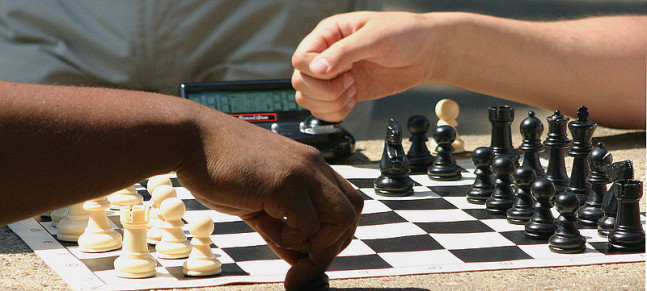Should we negotiate a partial deal with Iran now?
Apparently the Obama administration and Iran have come to a meeting of the minds whereby Iran will, for the moment halt further development of nuclear capacity and the U.S. with Europe will for the moment suspend some sanctions. The Israelis and Saudis vigorously oppose this deal, viewing it as a dangerous miscalculation, prematurely easing pressure right before it pays real dividends.
We often hear it said that the U.S. and its European allies are playing “a chess game” with this would-be nuclear power and fundamentalist sponsor of international terrorism. Can we secure a permanent advantage by forever stripping them of a nuclear weapons capacity? With no access to intelligence reports, I don’t really know how close Iran has come to developing a nuclear arsenal. But we all have access to the wisdom of the great chess analysts.
A chess game can be roughly divided into three phases: Opening, middle, and end game. Right now, our relations with Iran seem to solidly place us in the middle game, with all its attendant positional complications. Pressure mounts on Iran as our sanctions increasingly take a bite on its economy, threatening long term permanent damage if not collapse. Pressure mounts on the U.S. as Iran progressively moves toward a permanent nuclear capacity, invulnerable to Israeli, Saudi, and perhaps American attack.
We each face the same question, from radically different perspectives: Do we exchange material concessions, and convert the present position into a simplified endgame, where Iran’s economy, once again thrives without nuclear weapons, but retains an ongoing capacity to damage fundamental Western interests? Do they exchange their pressure on other nations in the region from their nuclear weapons capacity, for our pressure on their economy? With economic sanctions biting, and Iran’s “moderate” new President purring for a deal, for the moment we seem to have the advantage.
“Advantages are either permanent or temporary,” observed Reuben Fine, a great chess grandmaster and practicing psychoanalyst. “A permanent advantage is one which is inherent in the structure.” A temporary advantage, on the other hand would likely “be dissipated in the course of time.” Thus, “something should be done about it quickly.”
The U.S. and Iran must each decide whether to transition from middle game to end game. In chess, that generally means exchanging Queens. But that transition can also take place by exchanging minor pieces. Here it means exchanging some economic sanctions for a halt to Iranian progress toward nuclear weapons capacity. If Chess offers us valuable metaphors, perhaps we might mine it further. “The player must often make up his mind whether to stick to the middle game or go into an endgame,” counseled Fine, in his classic, The Middle Game In Chess. The answer depends on whether his advantage (or disadvantage) is permanent or temporary. “With a permanent advantage, or a temporary disadvantage, end-game play is called for, while with a temporary advantage, or permanent disadvantage, middle-game play is to be preferred.”
So where are we? Our goal should not be to punish Iran but to pressure it. To gain a permanent advantage, the U.S. must degrade Iran’s economy for the foreseeable future, forcing it to turn inward and restrict its internationally threatening and destabilizing behavior. We’re moving in that direction but don’t seem to be there yet. Of course, complete victory would include internal rebellion and replacement of the regime. To gain a permanent advantage, Iran must develop both a weapons capacity and an economy exempt from Western pressure, which would allow it to dominate the region.
Apparently, neither side yet has a permanent advantage. But Iran clearly seems to have a temporary disadvantage. Its currency devalues, its monetary reserves diminish, its economy falters. All this would end with a comprehensive negotiated agreement. Thus it seemingly makes sense for Iran to transition toward an endgame, even in small steps, by exchanging pieces. Iran, presently on defense, may well have concluded it’s best to continue its own positional play, negotiating for time, stripping down while we do, as Reuben Fine observed, trying to “draw a lost game.”
The U.S. and its European allies would seem to have a temporary advantage, not yet convertible to a permanent advantage. Even a temporary partial agreement would likely leave Iran in a better position, after recovering, to convert its nuclear fuel to weapons, support international terrorism and dominate the region permanently. Thus, it seems Israel and the Saudis are right on this one. The U.S. and Europe should rachet up the pressure, increase the sanctions, continue with the middle game. For if we play this phase correctly, skillful position play might allow us, in Fine’s terms, to demonstrate “the art of winning a won game.”
If so, let’s hope the Obama Administration has the guts to stick with it and win.


